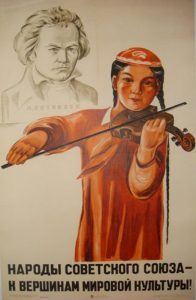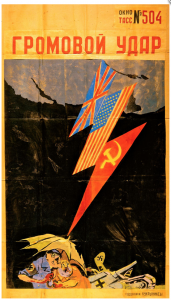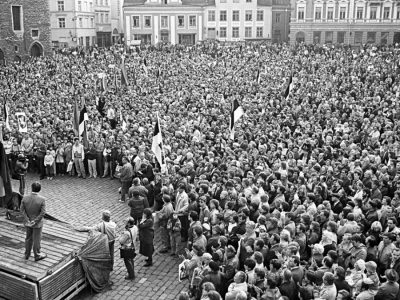One group that is often overlooked during wartime is women. Traditional values in Soviet culture told women to stay at home to tend to the children, cook dinner, clean up, and take care of other household issues. However, during the 1940s while men were away at war, women played a very different role in Soviet […]![]()
Month: March 2017
The 900 Day Siege of Leningrad
by •
The siege of Leningrad was one of the longest sieges in World War II. It lasted from September of 1941 to January of 1944 when the Germans were finally pushed back. In this time the city was relentlessly shelled and starved by the invading German Army. Although many people were evacuated in the beginning, more …
“Savage Minorities” and Paranoia
by •
A Russian victory in World War II was necessary for the reassertion of their legitimacy. 70+ years have passed since the Russian defeat over Nazi Germany, resulting in economic, political, and social upheaval once again; aimed at those who were “different” than the political elites. Stalin also felt compounding stress from: “[t]he Soviet Union, at … Continue reading “Savage Minorities” and Paranoia![]()
Purges, Patriots and New Men and Women
by •
Welcome back — We had a terrific crop of posts this week! With submissions touching on key aspects of Stalin’s leadership cult, the purges, the re-building of Moscow, and many components of the “Great Retreat” (Soviet Champagne, anyone?), this weekly edition provides a fascinating overview of Soviet life in the thirties. Your editorial team hopes you will catch up on posts in the slider (now bursting with five posts) and in Comrades’ Corner.
The trauma of World War II awaits us next week.
7th Blog Post Guidelines – The Great Patriotic War
by •
This week we turn our attention to The Great Patriotic War (aka World War II) and the immediate post-war period. Please use one of the modules from 1943 or 1947 in Seventeen Moments in Soviet History on-line archive. You may also use the module on Soviet Territorial Annexations from 1939. You should consult Ch. 12 in the Freeze text. If you are writing about something specific to the war, it would be worth considering William C. Fuller’s discussion on pp. 383-392 of Freeze about the reasons for Soviet victory.
The Metro That Moved Soviet Russia into Modernity
by •
Link to Brian’s post here.
The Metro that moved Soviet Russia into Modernity
by •
Several comparisons can be made between America’s roaring twenties and the USSR’s terrible terrific thirties. Economically, one can say that the soviets were thriving at this time, just as America was a decade ago, when studying the development and implementation of the Moscow Metro. With the first line of the subway opening in 1935 (The …
Continue reading “The Metro that moved Soviet Russia into Modernity”
Fame, Fortune and Propaganda
by •
No one thinks of aviation when thinking of Russia. But in the 1930s, flying was all the rage, with explorers adventuring out into the great white north. Each pilot set out to make a name for himself, and including one by the name of Valerii Chkalov. Chkalov entered the Soviet Air Force in 1921, but …
The Great Terror: Stalin Brings Down the Hammer and Sickle
by •
When one thinks of Stalin one of the first things that comes to mind is crushing oppression. Images of gulags and mass executions of political rivals, dissidents, and anyone deemed an ‘enemy of the people’, are forever intertwined with his name. The largest and most widespread of these purges known as the Great Terror occurred…
The Great Terror: Stalin Brings Down the Hammer and Sickle
by •
(Nikolai Krestinskii, Victim of the Great Terror) When one thinks of Stalin one of the first things that comes to mind is crushing oppression. Images of gulags and mass executions of political rivals, dissidents, and anyone deemed an ‘enemy of the people’, are forever intertwined with his name. The largest and most widespread of these … Continue reading →


